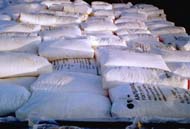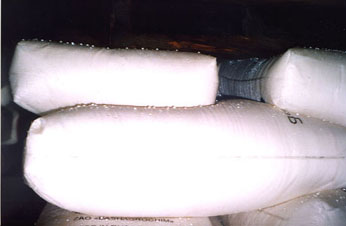Loading bagged fertilizer at Novorossiysk port
 While
loading bagged fertilizer, like other general cargo, the Master comes across the problem of signing the final cargo
documents,
Mate’s Receipts and Bills of Lading mentioning the quantity of the cargo loaded on board the
ship.
While
loading bagged fertilizer, like other general cargo, the Master comes across the problem of signing the final cargo
documents,
Mate’s Receipts and Bills of Lading mentioning the quantity of the cargo loaded on board the
ship.

When during loading tally of the cargo was not arranged Masters in order to protect the
vessels’ interests are trying to
insert “unknown quantity” remark into Mate’s Receipt and Bill of Lading.
The cargo shipper or the forwarding companies, acting on behalf of the cargo
shipper, never accept such remark for inserting into Bill of Lading. The
situation described results in the ship’s delay in the port after completion
of loading due to long useless discussions between the shippers and the Masters.
If
we look into the Customs & Regulations of the Novorossiysk port we can find
the following clause:
“Receipt
and delivery of cargoes take place alongside a vessel with indispensable
preparation of mutually signed Tally Sheets of appropriate form. Moreover, each
cargo “lift” and the total amount of loaded/discharged cargo should be
confirmed by the signatures of both parties. Any amendments to Tally Sheet are
permitted only if agreed by both parties and confirmed respectively with
signatures of tallymen of NCSP (Novorossiysk Commercial Sea Port) and those
appointed by a vessel. Tally sheets with amendments that have not been agreed or
made solely by the vessel are not valid. If the vessel does not provide own
tallymen, NCSP tallymen’s counts shall be binding. In this case, cargo
documents that were made according to counts of NCSP are to be signed by the
Master without remarks, regardless whether the Master was provided with
information about loaded/discharged cargoes or not”.
So,
when vessel’s tallymen are not appointed, the port tallymen’s counts are
binding and in these circumstances the Mate’s Receipts and Bills of Lading are
to be signed by the Master without remarks in respect of quantity of cargo
loaded. Taking advantage of this term the cargo shippers insist upon signing the
Bills of Lading without the remark “quantity unknown” and never accept
remark “as per shipper’s tally”.
Referring
to the Merchant Marine Code of Russia we would like to quote Article 145:
“Clauses
to Bill of Lading. Probative Force of Bill of Lading.
Where
the Bill of Lading contains information concerning the names of cargo, its
principal markings, number of packages or items, mass or quantity of goods, in
respect of which the Carrier or other person issuing the Bill of Lading on his
behalf knows of, have sufficient reason to believe that such information does not
correspond to the cargo actually received or loaded at the moment of issue of
the Bill of Lading, or if the Carrier or such other person did not have
reasonable opportunity to check the information supplied , the Carrier or such
other person is to enter the Bill of Lading a clause exactly specifying the
discrepancies, ground for supposition or the lack of a reasonable
opportunity to check the said information.
Generally
speaking, the failure to perform tally on the ship’s side during loading of
general cargo is not a justified excuse for the carrier who is to take every
opportunity to check the information described in the Bill of Lading and that
stated by the Cargo Shipper. Moreover, this will not remove liability from the
Carrier under the contract of carriage in case of any claim for shortlanding.
One may state that the cargo can be tallied by power of the vessel’s crew members. However, when tally is performed by crew members the possibility of making mistake is rather high.
We
have a lot of examples when port tally was carried out incorrectly and taking
into account our experience we can say that participation of experienced
tallymen prevents from shortloading claims.